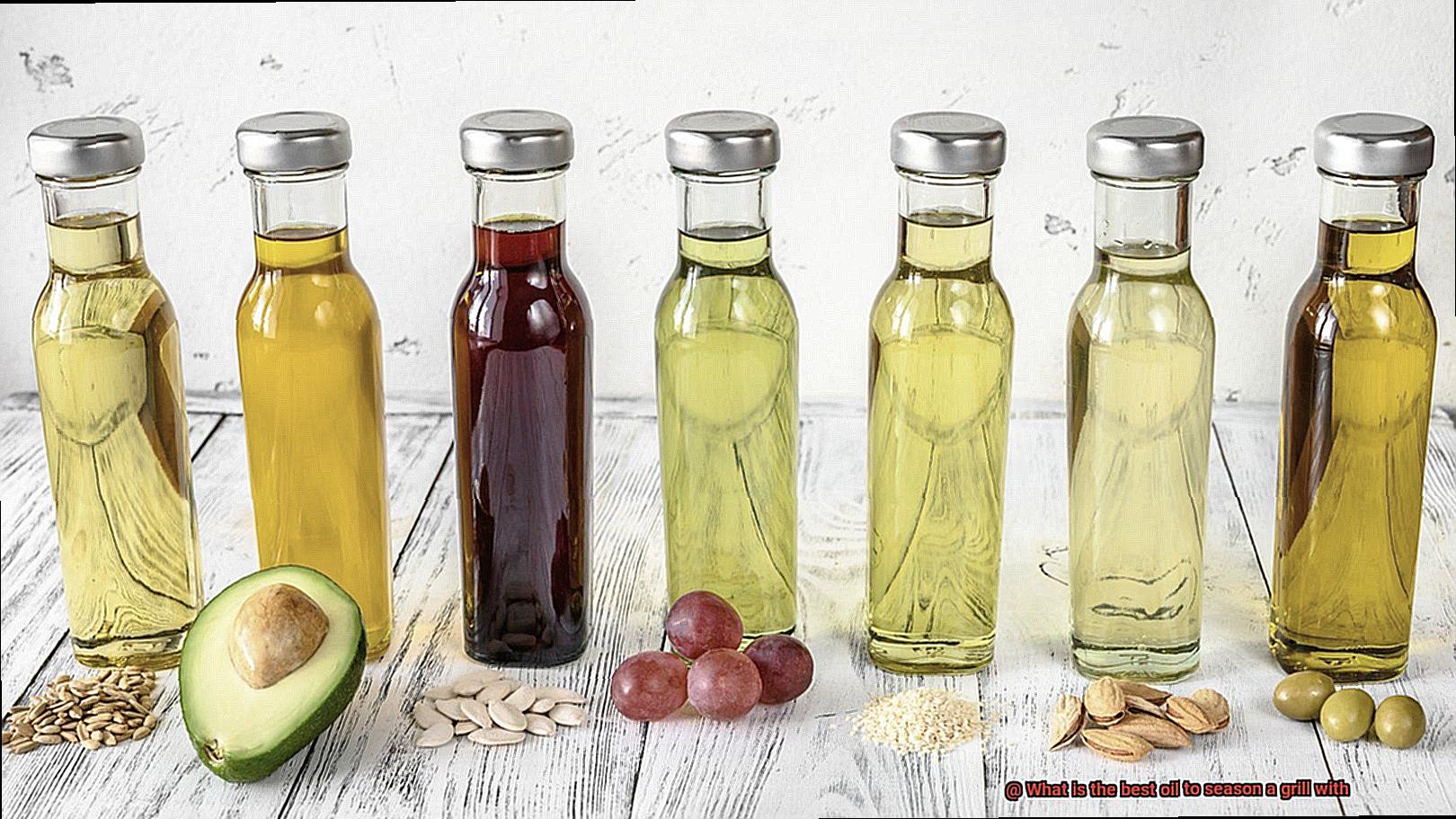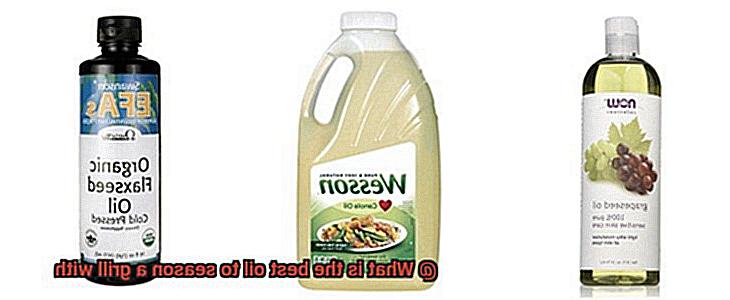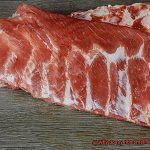Are you tired of prying your food off the grill with a spatula, only to find it’s left half of itself behind? Or maybe scrubbing down your grill has become a workout in and of itself? Fear not, my fellow grill enthusiasts – the solution to these problems lies in seasoning. And the key ingredient to that seasoning is the oil you choose.
But with so many oils out there, how can you be sure which one is best? Some swear by vegetable oil while others are convinced peanut or olive oil reigns supreme. In this blog post, we’ll explore the best oil to season a grill with – backed up by research and expert opinions.
First things first: what exactly is seasoning and why is it important? We’ll break it down for you. Then we’ll dive into the different oils available to you, weighing their pros and cons and giving you all the information you need to make an informed decision.
No matter which oil you choose, we’ll also outline the steps necessary to season your grill correctly. By the end of this post, you’ll be armed with all the knowledge necessary to achieve grilling greatness – no more sticking or scrubbing required.
So grab a cold drink and settle in – we’re about to take a deep dive into the wonderful world of grilling.
Contents
What is Grill Seasoning?
As grilling season approaches, it’s important to remember that a well-maintained grill is the key to successful cookouts. A crucial aspect of grill maintenance is seasoning. But what exactly is grill seasoning, and why is it so vital?
Grill seasoning involves applying a layer of oil to the grates to prevent food from sticking, making cooking and cleaning easier. The oil acts as a barrier between the food and the grates, preventing direct contact, which can cause sticking.
Choosing the right oil for seasoning your grill is crucial since it can impact the taste of your food and your overall cooking experience. Among the most popular oils are vegetable oil, canola oil, peanut oil, and grapeseed oil.
Vegetable oil is a top choice for many because it’s easily accessible, affordable, and has a high smoke point. Smoke point refers to the temperature at which oil starts to smoke and break down, causing an unpleasant taste and potentially harmful compounds. Vegetable oil has a smoke point between 400-450 degrees Fahrenheit, which is sufficient for most grilling purposes.
Canola oil is another excellent option as it has a milder flavor than vegetable oil and less saturated fat. Peanut oil is less common but has a high smoke point and a nutty taste that some people prefer. However, those with peanut allergies should avoid it.
Grapeseed oil is a newer option that has gained popularity due to its high smoke point and neutral flavor. It also contains antioxidants that help reduce inflammation in the body.
Ultimately, the best oil for seasoning your grill will depend on personal preference and the type of food you’re cooking. Experimenting with different oils can help you find the one that works best for you and enjoy perfectly grilled meals all season long.
Types of Oil for Grill Seasoning
Grilling is an enjoyable summer pastime, and seasoned grillers understand that maintaining a well-oiled grill is crucial. One essential element of grill maintenance is seasoning the grill, which involves applying oil to the grates. However, with so many oils available, it can be challenging to determine what works best for seasoning your grill.
One of the most popular oils for grill seasoning is vegetable oil. This neutral-tasting oil has a high smoke point, which means that it can withstand high temperatures without burning or smoking excessively. Vegetable oil’s neutral flavor allows the natural flavors of the food being grilled to shine through. Additionally, it is readily available and affordable, making it a convenient option for many grillers.

Canola oil is another commonly used oil for grill seasoning due to its neutral flavor and high smoke point. It also contains less saturated fat than other oils, making it a healthier option. Canola oil is suitable for almost any dish and is an excellent substitute for vegetable oil.
If you want to add a bit more flavor to your grilled dishes, consider using peanut oil. This flavorful oil has a nutty taste that pairs well with grilled meats and vegetables. It also has a high smoke point, which makes it an excellent choice for grilling.
Olive oil is another healthy option that contains antioxidants and healthy fats. However, extra-virgin olive oil has a lower smoke point than other oils, making it better suited for low to medium heat grilling or as a finishing oil after cooking. It also adds a distinct flavor to your grilled dishes.
For those who prefer more exotic flavors, sesame oil is an excellent choice for grill seasoning. This nutty-flavored oil pairs well with grilled meats and vegetables but has a low smoke point and should be used sparingly to avoid burning.
Benefits of Vegetable Oil for Grill Seasoning
As the grill season heats up, the choice of oil used for seasoning is an important decision that can make or break your meal. Luckily, vegetable oil is an excellent option that offers numerous benefits for grill enthusiasts.
One of the most significant advantages of using vegetable oil for grill seasoning is its high smoke point. This means that it can handle high temperatures without burning or smoking excessively, ensuring that your meats and vegetables cook to perfection. No one wants burnt food ruining their meal, and vegetable oil can help prevent that.
Aside from its practicality, vegetable oil also has a neutral flavor that won’t overpower the natural taste of your food. Unlike other oils like olive oil or coconut oil, vegetable oil allows the flavors of your grilled goodies to shine through, while still providing a light coating for the grill.
Moreover, vegetable oil is widely available and affordable, making it a practical choice for many grillers. You can find it easily in most grocery stores and is typically more affordable than other specialty oils.
But wait – there’s more. Vegetable oil is also a healthier option compared to other oils like animal fats or butter. It is low in saturated fat and high in unsaturated fat which can help lower cholesterol levels and reduce the risk of heart disease.
Benefits of Canola Oil for Grill Seasoning
That’s why I highly recommend canola oil for all your grilling needs. This versatile oil offers numerous benefits that make it the perfect choice for grill seasoning.
First and foremost, canola oil has a high smoke point. This means it can withstand high temperatures without breaking down and producing harmful fumes. As a result, you can enjoy beautiful grill marks on your meats and veggies without worrying about burning or smoking excessively.
Moreover, canola oil has a neutral flavor that won’t overpower the taste of your food. Unlike other oils with distinct tastes or aromas, canola oil allows you to enhance the natural flavors of your grilled goodies without adding any unwanted flavors.
But it’s not just about taste. Canola oil is also low in saturated fat and high in monounsaturated fat, making it a healthier alternative to other oils that are high in saturated fat. By using canola oil for grill seasoning, you’ll be able to reduce your overall intake of unhealthy fats without sacrificing flavor.
And let’s not forget about the high level of omega-3 fatty acids found in canola oil. These beneficial fatty acids have been shown to reduce inflammation and improve heart health. By incorporating canola oil into your grilling routine, you’ll be able to enjoy delicious grilled foods while adding these heart-healthy nutrients to your diet.
Last but not least, canola oil is incredibly versatile and can be used for a variety of other cooking methods such as baking, frying, and sautéing. So if you have any leftover oil after grilling, you can easily use it for other cooking needs.
Benefits of Peanut Oil for Grill Seasoning
While canola oil may have been a go-to option in the past, peanut oil has taken the lead due to its impressive benefits.
Firstly, let’s talk about its high smoke point and neutral taste. Peanut oil can withstand high temperatures without breaking down or burning, making it perfect for grilling. Plus, it won’t interfere with the taste of your food, allowing you to fully enjoy the flavors of your grilled goodies.
But that’s not all. Peanut oil also contains healthy monounsaturated and polyunsaturated fats that are great for heart health. So not only will you enjoy delicious grilled dishes, but they’ll also be beneficial for your well-being.
One of the most significant benefits of using peanut oil for grill seasoning is its non-stick properties. When used to season your grill grates, it creates a slick surface that prevents food from sticking. This makes it easier to flip and move your food around without it falling apart or getting stuck to the grates. And when it’s time to clean up, there’s less residue left behind, making it a breeze.
Another advantage of using peanut oil is its longer shelf life compared to other oils. This means you can store it for longer periods without worrying about it going rancid. This is particularly useful if you only grill occasionally or have a smaller grill that doesn’t require large amounts of oil.
However, if you have a peanut allergy, it’s crucial to avoid using peanut oil. In this case, alternative oils like avocado or grapeseed oil are excellent substitutes as they also have high smoke points and neutral flavors.
Factors to Consider When Choosing an Oil for Grill Seasoning

Look no further than the oil you use for seasoning. But with so many options out there, how do you choose the best one? As an expert in this area, I’ve put together some essential factors to consider when selecting the perfect oil for your grill.
First and foremost, let’s talk about smoke point. You want to avoid oils that break down and smoke at high temperatures, which can ruin the flavor of your food and even release harmful chemicals. So go for oils with high smoke points like peanut, avocado, or grapeseed oil.
Flavor is also a key consideration. Different oils have unique tastes, so choose one that enhances the flavors of your food. For instance, seafood pairs well with light olive oil or grapeseed oil, while more robust oils such as avocado or peanut oil are perfect for red meat.
Health benefits are equally important. Some oils have higher levels of saturated fats that contribute to health issues like heart disease. Opt for oils with monounsaturated or polyunsaturated fats instead, such as avocado or olive oil.
Lastly, don’t forget about availability and cost. While exotic oils may sound tempting, they can be harder to find and more expensive. Stick to affordable and easily accessible options like peanut oil.
How to Apply the Oil to Your Grill Grates
Grilling is a favorite pastime for many people, but it can be frustrating when food sticks to the grill grates. This is where applying oil to your grill grates comes in. In this guide, we’ll walk you through the steps of how to apply oil to your grill grates for even cooking and delicious results.
Choose the Right Oil
The first thing to consider when applying oil to your grill grates is your choice of oil. The best oils for seasoning grill grates are those with high smoke points, such as canola, vegetable, or grapeseed oil. These oils can withstand high temperatures without burning or smoking excessively, which can ruin the flavor of your food.
Clean Your Grates
Before applying oil to your grill grates, make sure they are clean and free of debris. You can use a grill brush to remove any leftover food or residue from previous grilling sessions. This will ensure that your food cooks evenly and doesn’t stick to the grates.
Apply Oil Evenly
Once your grill is clean, it’s time to apply the oil. Use a clean cloth or paper towel to apply a thin layer of oil to the grates. Be sure to cover every surface of the grates, including the sides and corners. You want to avoid using too much oil because it can cause flare-ups and make your food taste greasy.
Let it Sit
After applying the oil, let it sit for a few minutes to absorb into the grates. This will help ensure that your grates are evenly coated and ready for cooking. It also allows the oil to penetrate deep into the pores of the metal, creating a non-stick surface.
Remove Excess Oil
Once the oil has had time to absorb, use a grill brush to scrub off any excess oil and debris. This will help ensure that your grates are clean and ready for cooking. You can also use a paper towel to wipe away any excess oil.
Season Your Grates Occasionally
While it’s important to season your grill grates before every use, you only need to do it occasionally. Over time, the oil will build up on the grates and create a non-stick surface that makes cooking easier and prevents food from sticking. So, don’t worry if you forget to season your grates every time you use your grill.
yE7T2Zkeyqw” >
Conclusion
In conclusion, the right oil for seasoning your grill is a game-changer when it comes to achieving mouth-watering, perfectly grilled meals. Seasoning your grill involves applying a slick layer of oil to the grates, which not only prevents food from sticking but also makes cleaning up a breeze.
Vegetable oil is an all-time favorite for many grill masters due to its affordability, accessibility, and high smoke point. Canola oil is another excellent option with a milder flavor than vegetable oil and less saturated fat. For those who want to add a nutty taste to their grilled meals, peanut oil is an exceptional choice with its high smoke point. Alternatively, grapeseed oil has gained popularity in recent years due to its neutral flavor and high smoke point.
When selecting an oil for seasoning your grill, consider key factors such as smoke point, flavor profile, health benefits, availability, and cost. To create that perfect non-stick surface on your grates, make sure you apply the chosen oil evenly after giving them a good scrub.






